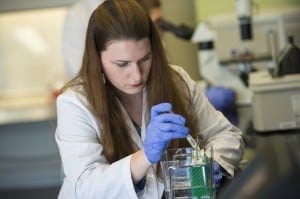
Cedarville University’s School of Pharmacy is partnering with regional hospitals to meet a need for medication reconciliation through a program with student pharmacists.
Medication reconciliation involves a comprehensive review of a patient’s medications after being admitted to the hospital and ensures accuracy and safety during treatment. This process allows the medical staff to learn the medications the patient is taking at home, whether they are contributing to the patient’s problems and which medications should be included when the patient is discharged.
Thad Franz, Pharm.D., director of experiential programs and assistant professor of pharmacy practice, said this process is especially important when patients have chronic diseases.
“These patients need a lot of medications and there can be problems,” he said. “Good medication reconciliation work prevents medication errors.”
The School of Pharmacy’s inaugural class of second-year professional students has been working in the emergency departments of three institutions in the Springfield and Dayton areas. The students have been working with patients, nurses, pharmacists and physicians to create accurate lists of patient medications. When physicians have a good list to use, Franz said, they can make better recommendations.
“Research has shown that if patients have a good list on admission,” he said, “there are less errors and a lower risk for the patients.”
Franz said the program was created when a pharmacist from a local institution brought the need for medication reconciliation to the attention of the school.
“We saw a need and found a way to partner to meet that need through student experience,” he said. “This program provides the institutions with improved safety, improved customer service and important collaborations with partners such as Cedarville’s School of Pharmacy.”
The students have benefited through the real-life application of their classroom knowledge, Franz said. They have learned to communicate efficiently with patients and other health care professionals in the emergency department setting. Experiencing issues such as drug abuse and trauma have shown students real problems in pharmaceutical work and provided them with the opportunity to connect and emphasize with the people they meet in their field.
Each of the institutions involved have been very satisfied with the program and impressed with the students, Franz said, and the School of Pharmacy plans to continue the partnerships through future students.
“It’s the success of programs like this that will continue to open doors for the School of Pharmacy and student experience as we continue to develop the full program,” he said. “These innovative programs, while meeting the needs of others, will show the profession of pharmacy who Cedarville is.”
Cedarville University, located east of Dayton, Ohio, has 3,459 students in more than 100 areas of study. A Baptist university of arts, sciences, professional and graduate programs, Cedarville is recognized nationally for rigorous academic programs, strong graduation and retention rates, accredited professional and health science offerings, and leading student satisfaction ratings. Visit the University online at www.cedarville.edu.
Throughout the year, our writers feature fresh, in-depth, and relevant information for our audience of 40,000+ healthcare leaders and professionals. As a healthcare business publication, we cover and cherish our relationship with the entire health care industry including administrators, nurses, physicians, physical therapists, pharmacists, and more. We cover a broad spectrum from hospitals to medical offices to outpatient services to eye surgery centers to university settings. We focus on rehabilitation, nursing homes, home care, hospice as well as men’s health, women’s heath, and pediatrics.







